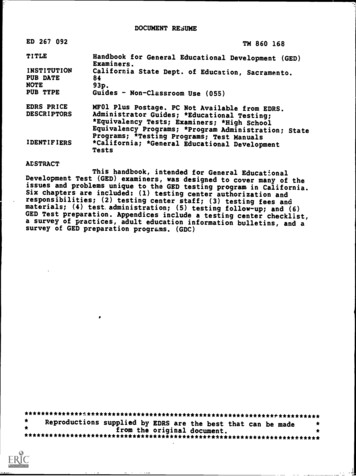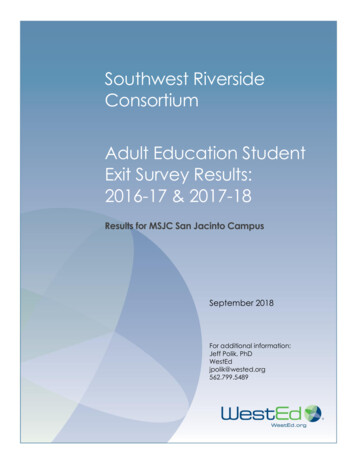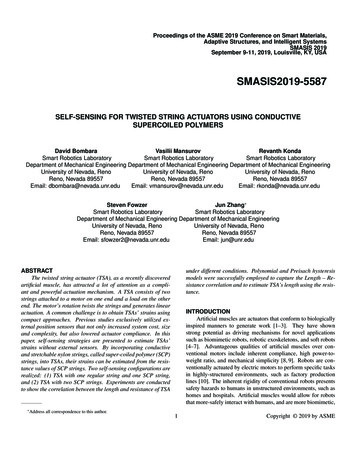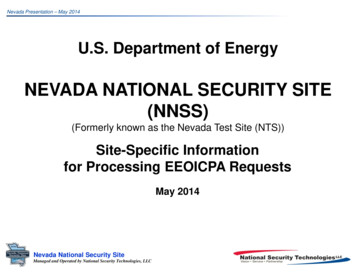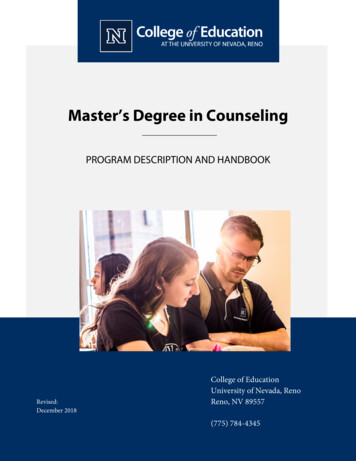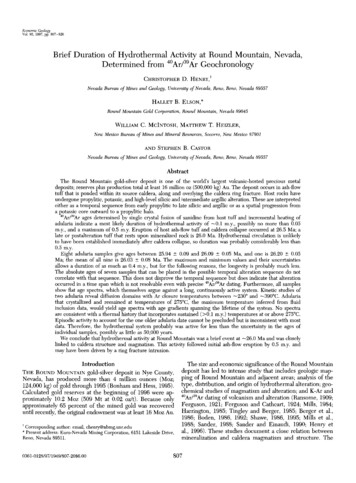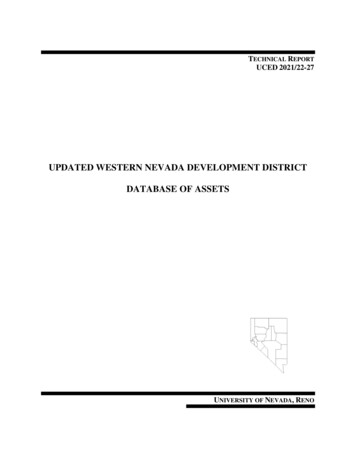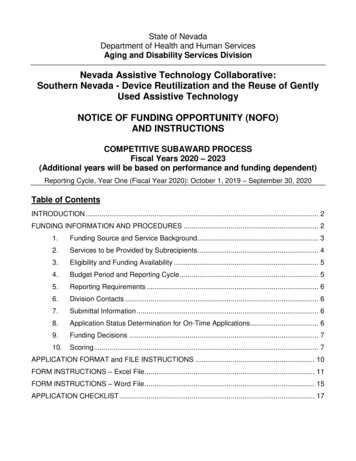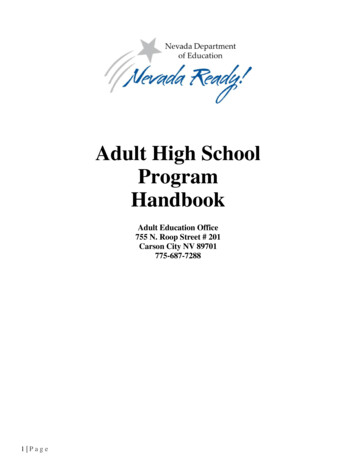
Transcription
Adult High SchoolProgramHandbookAdult Education Office755 N. Roop Street # 201Carson City NV 89701775-687-72881 Page
NEVADA ADULT HIGH SCHOOL PROGRAMS 3GOALS 3I.PROGRAM GUIDELINES 3II.Student Assessment: Students should be assessed upon program enrollment.FiscalProgram CurriculumAdult Standard Diploma RequirementsStudent Orientation/CounselingA.B.C.D.E.33445III.STUDENT ELIGIBILITY 5IV.CREDITS 5CreditsCredit by Exam (CBE)Credit Transferred from Other Education ProgramsCredit Transferred from Military Education ProgramsCredit for Summer School ProgramsCredit for University CoursesCredit for Correspondence/Distance Education CoursesPhysical Education Credit Transferred in From Other Educational ProgramsCredit for Apprenticeship ProgramsCredit for Attending Accredited Career SchoolsCredit for Work ExperienceCredit EvaluationA.B.C.D.E.F.G.H.I.J.K.L.666777777778HSE GUIDELINES 8V.A.B.C.D.G.H.I.VI.Statement of Purpose 8Registration Procedures and Pricing 8High School Equivalency (HSE) Certificate 8Requirements for Testing and Issuance of Certificate 9Questions/Inquiries 9HSE WAIVER OF CREDITS 9Credit Waiver Criteria 10INDEPENDENT STUDY AND DISTANCE EDUCATION 10A.B.Independent Study 10Distance Education 12VII.EOC TESTING 13A.Testing 14VIII. RECORD KEEPING 14IX.AHSD FUNDING FORMULA 15Adult High School Program List 17Applicable NRS and NAC 182 Page
NEVADA ADULT HIGH SCHOOL PROGRAMSThe mission of Adult High School Programs in Nevada is to Engage, Educate, and Empower communities ofadult learners by advancing literacy skills and employment opportunities to achieve a better quality of life. Theadministration of an Adult High School Program is the responsibility of each school district that chooses tooperate a program.I. GOALS Provide free academic counseling and instruction to eligible students who lack a high school diploma or aHigh School Equivalency (HSE) certificate. Provide instructional services to students lacking foundational academic skills. Encourage students with HSE certificates to pursue an Adult Standard Diploma. Provide courses that prepare adults, upon graduation to be college and career ready.II. PROGRAM GUIDELINESA. Student Assessment: Students should be assessed upon program enrollment.1. Students who score below the high school level should be enrolled in literacy and/or basic educationprograms.2. ESL students should be assessed with CASAS, TABE or a nationally recognized approvedassessment instrument.3. Students who score below the high school level should be re-assessed with an approvedassessment within stated guidelines to ensure the student can find success before the studentmoves on to high school level curriculum.B. Fiscal1. The Adult Education Grant period is from July 1st to June 30th.2. Tentative annual program funding levels will be released to the program directors each March.3. Fiscal Year (FY) Proposed Budgets are due to the Office of Adult Education by May 30th each year.A signed Assurance is required to be submitted with the budget.4. Requests for Funds are due by the 15th of the month following the month the funds were expended.The final Request for Funds must be submitted no more than 21 calendar days after the program yearhas ended.5. End of FY Final Financial Reports are due to NDE Grants Management Unit no later than July 31steach program year.6. State funds allocated in the first year of the biennium may be carried forward into the second yearbut CANNOT exceed 10% of the total allocation.Any unexpended funds remaining as of June 30th of the end of the biennium cannot be rolledover and the unspent balance will be returned to the State General Fund. (SB 555)7. Allocation of Adult High School Funding is distributed based on a formula. The formula calculates65% enrollment and 35% performance based on diplomas granted, HSE certificates issued, andEmployability Skills completions for those eligible, enrolled students.8. The Adult High School Reporting System (AHSRS) Data Report is due to the Office of AdultEducation by July 15th each year.9. Data reported in the AHSRS within a fiscal year will determine funding for the FY two years3 Page
following the report. Data must be verified by the director prior to submission. Any substantialfindings of unverifiable data could result in a corresponding reduction in total funding levels.10. Students working toward an Adult High School Diploma or HSE Certificate through an Adult HighSchool Program shall not be assessed a tuition fee.11. Lab fees and book deposits may be required according to school district policy.C. Program CurriculumPrograms may include instruction in Adult Basic Education, HSE preparation, English Literacy, AdultSecondary Education, Career Pathways and Transition to Postsecondary.Curricula used in Nevada’s school districts and Adult High School Programs must reflect state andschool district standards.Each district may set additional standards to supplement or augment the state’s minimumrequirements.D. Adult Standard Diploma Requirements“Adult Standard Diploma” means a diploma earned by meeting requirements established by the districtwhich conform to guidelines established by the Nevada Department of Education as published in(NAC 390.470).A school district’s Adult High School Program may award an Adult Standard Diploma, signifyinggraduation from high school, to a person who:1. Withdrew from high school before his/her graduation and was not eligible to graduate with his/herclass and,2. Has earned through high school, an adult education program or an alternative education program(NRS 388.537) or has waived through high school equivalency testing, the units of credit required asfollows:Minimum Required CourseNumber of CreditsAmerican Government1American History1Arts and Humanities, or Career andTechnical Education1English4Health Education½Mathematics3Science2Use of Computers½Elective Courses7½TOTAL20 ½3. Is 18 years of age or older at the time of the award.**Note: 16- or 17-year-old students may attend adult programs for the purpose of HSE preparation only. A 17-year-oldstudent may receive an Adult Standard Diploma if that student is enrolled in an alternative education program for students atrisk of dropping out of school. That student may earn an Adult Standard Diploma either by earning or waiving creditsthrough passage of a state-approved HSE test and completing all requirements, as necessary. (NRS 388.537, NAC 390.115,4 Page
NAC 390.500)E. Student Orientation/CounselingPrior to the enrollment of a student in an Adult High School Program, comprehensive guidance andcounseling will be performed. Credit to be applied to the Adult Standard Diploma will be evaluated,verified, and granted. Through these efforts, Adult High School Program personnel will seek to promoteand enhance academic, personal, social, and career development for students. The counseling effortshould develop an individualized graduation plan tailored to the needs of the enrolling student. Studentsin need of career/occupational development will be identified and guided to a curriculum related toemployment, skills development and occupational training, and will eventually receive assistance withemployment placement.III. STUDENT ELIGIBILITYNAC 387.190Adult High School Program (NRS 385.080)1. A person who:(a) Is at least 18 years of age or who meets the requirements for participation in a program of educationfor incarcerated persons established pursuant to NAC 388H.040;(b) Has not received his or her high school diploma; and(c) Is not currently enrolled in a high school, may be enrolled as a pupil in an adult high school programdesigned to enable him or her to obtain a diplomaStudents 16-years of age or older may prepare for the HSE Test within Adult High School Programs.Applicants who are 16 or 17 years of age may register to take the HSE exam after presenting writtenpermission from the local school board of trustees, written permission signed by parent or legal guardian,verification of withdrawal from school, and meeting all criteria as listed in NAC 390.115 and NAC 387.190.Adult High School Programs may provide remedial instruction or credit recovery to students enrolled in aregular high school or an alternative high school if there is space available in the class, and no adult studentsare excluded because of the alternative education student’s attendance. These students are, by definition, stillenrolled in K-12 but at risk of dropping out. These students may not be included in enrollment or completioncounts for Adult High School Programs as they are still enrolled and would be counted in K-12 system reports.Per-pupil apportionment for Alternative Education students is funded through the Distributive School Account(DSA). The AHSD program may charge these students a reasonable fee for each course the student takes.If a student completes his/her senior year of high school and does not meet the requirements for graduationprior to the first day of the next school year, he/she may not receive a Standard High School Diploma unlesshe/she remains an enrolled student of the comprehensive high school to complete those requirements. If thatstudent elects to enroll in the adult program, upon completion of the requirements for graduation he/she willbe issued an Adult Standard Diploma per NAC 387.190, 387.330, 390.480.Adult High School Programs are provided by the local school districts to serve out-of- school persons whodesire to earn an Adult Standard Diploma or HSE Certificate. Such persons must be at least 18 years of ageor older* and have no intention of returning to a regular high school.*Refer to NAC 387.190, 389.695.Correctional Education programs may serve any student needing academic skill development but only thosestudents that lack a high school diploma may be counted for enrollment in the end of year report.(388H.040)IV. CREDITSCourse offerings and the amount of credit awarded must align with state and district standards.5 Page
“Unit of Credit” means the amount of credit awarded to a pupil for his/her successful completion of acourse containing at least 120 hours of instruction or the equivalent. Note: One-half credit class contains 60hours of instruction or the equivalent.All of the methods listed below are available to the Adult High School Program for awarding units ofcredit to students earning the Adult Standard Diploma provided that the local school district utilizes thesemethods, has approved policies regarding these methods, or has approved the policies of the Adult HighSchool Program.1. Local school districts will determine the number of credits awarded through these methods and therequirements for receiving credit according to state standards.A. Credit may be granted on the following basis if competency has been demonstrated:120 clock hours of classroom instruction and/or demonstrated competency – 1 Unit60 clock hours of classroom instruction and/or demonstrated competency – 1/2 UnitSeat-time, by itself, must not be the sole basis for receiving credit.Assignment requirements for a grade to be achieved and the method of challenge used to determinecompetency must follow the school district regulations. Assignments shall be prepared by teachers tomeet student needs.A school calendar for an Adult High School Program, an Alternative Education program, a program ofDistance Education, or a program of instruction in a detention facility must contain at least 180 schooldays in session. A program of less than 180 days in session must be approved in writing by theSuperintendent of Public Instruction and demonstrate progress or completion by pupils in a curriculumwhich is equivalent to the regular school curriculum.The minimum daily period for an Adult High School Program, an Alternative Education program, aprogram of Distance Education, a program of Independent Study or a program of instruction in adetention facility is identical to the period for a regular grade unless the school district:1. Exercises its option pursuant to subsection 4 of NAC 387.140 Short School Day in Session: or2. Obtains the written approval of the Superintendent of Public Instruction for a program thatdemonstrates progress or completion by pupils in a curriculum that is equivalent to the regularschool curriculum.B. Credit by Exam (CBE)A pupil may be granted credit for a specific course of study in a secondary school without havingattended the regularly scheduled classes in the course if he or she demonstrates competence to meet theobjectives of the course through performance on an examination. (NAC 389.670)When a school district allows a student in a comprehensive high school to challenge a course, thatmethod of obtaining credit is open to an Adult High School student. All CBE’s must be based on highschool curricula. For students to receive credits, they must pass the exam pursuant to district policy(NAC 389.670 (3))C. Credit Transferred from Other Education Programs1. An accredited public or private high school located in this state.2. An accredited public or private high school located outside this state.3. An institution of higher learning whose academic programs are accredited by a national accreditingorganization.4. An adjudicated youth facility such as; The Nevada Youth Training Center (Independence HighSchool) or C.O. Bastian High School.6 Page
D. Credit Transferred from Military Education ProgramsAdult High School Programs may award units of credit toward meeting the requirements for an AdultStandard Diploma if the student has successfully completed a course given by the United States ArmedForces. (NAC 390.490)E. Credit for Summer School ProgramsSummer school units of credit to be applied toward the Adult Standard Diploma may consist only ofunits earned through a summer school conducted by an accredited public or private high school or anaccredited institution of higher learning.Such units must be earned in courses which are equivalent to the courses offered in the programs of anaccredited high school.F. Credit for University CoursesCredit may be granted for college-level courses completed at a recognized university, college, juniorcollege, or community college as approved in district regulations.G. Credit for Correspondence/Distance Education CoursesAdult High School Programs may grant a student credit toward an Adult Standard Diploma forsuccessful completion of a correspondence course if the course is provided by a secondary educationalinstitution which is nationally accredited, or the course is included on the state-approved list ofDistance Education providers (http://www.doe.nv.gov/Distance Education/Home/).H. Physical Education Credit Transferred in From Other Educational ProgramsIf a student is eligible to transfer credit for physical education courses into the Adult High SchoolProgram that credit can be applied toward the elective credit requirement.I. Credit for Apprenticeship ProgramsAdult High School Programs may award credit for electives to students who have participated in anapprenticeship program.J. Credit for Attending Accredited Career SchoolsAdult High School Programs may award credit for electives to students who have attended accreditedcareer schools such as those approved by the Nevada Commission on Postsecondary Educationaccording to prescribed guidelines.K. Credit for Work ExperienceAdult High School Programs may award elective credit to students who have attained employmentexperience which meets the following criteria. Through employment, the student, according to districtpolicy and standardized curriculum:1. Has demonstrated attitudes necessary for successful job performance and cooperation with fellowworkers.2. Has developed a sound basis for a career choice through appraisals of individual abilities, interests,aptitudes, and attitudes considering future employment outlook.3. Has developed pride in doing one’s job well.4. Has gained exploratory experiences and training opportunities.5. Has learned to make use of, and further develop, the skills learned in school in a real job setting.7 Page
6. Has understood the relationship between formal education and job success.7. Has gained insight in the transition from school to work.8. Has met changes in the world of work through personal contacts and feedback from employers.L. Credit EvaluationWhen students register for the Adult High School Program, they should present a copy of their mostrecent high school transcript, and/or a copy of their HSE transcript when applicable. This information isfor the purpose of determining the number of credits the student has earned and to help determine thebest way to obtain the remaining credits to earn the Adult Standard Diploma.In the event a student does not have academic records at registration, he or she must send for the recordsusing a request form and an Authorization to Release Information form, (See Appendix, Forms). Whendealing with a comprehensive high school or HSE program name and dates on the records need to beaccurate.Transcripts coming from other states may require interpretation. Credits must be pro- rated to one-halfor one-fourth credit units. (NAC 389.668)Photocopies of all documentation used to verify existing credits must be maintained in a student’s filewhile a student is enrolled.V. HSE GUIDELINESFor current Nevada HSE policy information, visit:http://www.doe.nv.gov/Adult Education/HSE Home/A. Statement of Purpose1. Policy: Current available Nevada state-approved tests of High School Equivalency are the GED (GED Testing Service) and HiSET (ETS). The High School Equivalency tests are designed toprovide an opportunity for adults who have not graduated from high school to earn a highschool-level educational equivalency. The High School Equivalency tests measure the majoracademic skills and knowledge associated with a high school program of study with increasedemphasis on workplace and higher education.All persons involved in administering the HSE Tests or any portion of the HSE Testing Program areprohibited from being involved in preparation or instruction and must abide by all rules and regulationsof the individual HSE assessment vendor.B. Registration Procedures and Pricinghttp://www.doe.nv.gov/Adult Education/HSE Home/Registration procedures are determined by individual testing center. To locate the HSE testing center inthe county of residence, call the district office or adult education center in your county or visit:www.nevadaadulteducation.org.C. High School Equivalency (HSE) CertificateIn the absence of a high school diploma, the HSE test is used as a measure of an individual’s basiccompetencies in the areas of English (Writing and Literature), Social Studies, Mathematics, and Science.This certificate is accepted by the employment and academic communities as an accurate assessment ofbasic skills.Students wishing to obtain a copy of an HSE certificate must contact Diploma Sender atwww.diplomasender.com8 Page
D. Requirements for Testing and Issuance of Certificate:1. Minimum Age for Testinga. 18, except in the following cases:Applicants who are 16 or 17-years of age may register to take the HSE exam after presentingwritten permission from the local school board of trustees, written permission signed by parentor legal guardian, verification of withdrawal from school, and meeting all criteria above. SeeNAC 385.402, 385.4042. Residencya. Certificates of High School Equivalency are issued to persons who reside in the State ofNevada at the time of testing or are on active military duty and have attended a secondary schoolin Nevada.b. Nevada’s residency policy for HSE testing allows for testing certain non- residents who live nearthe border of Nevada in adjacent states when a testing site is not easily accessible in their ownstate.3. English and Spanish Test Scores Cannot be Combined.G. All other questions or inquiries to be referred to:Nancy Olsen, State HSE AdministratorOffice of Career, Technical & Adult EducationNevada Department of Education755 North Roop StreetCarson City, Nevada 89701Telephone Number: (775) 687-7287 nolsen@doe.nv.govH. HSE WAIVER OF CREDITS (NAC 390.500):A student may waive as many as eleven (11) credits after successfully passing state- approved HSEtests toward an Adult Standard Diploma. The higher the scores, the more credits may be waived. It isrecommended that pre-testing, preparation/instruction, and counseling take place before a studentparticipates in HSE testing.The following tables set forth the scores which must be achieved on the HSE tests to obtain waivedcredit and the corresponding number of credits which may be awarded.General Educational Development (GED, 2014 Series)Maximum Number of UnitsTestfor Score of145 to 157for Score of158 or higherLanguage ArtsI24MathematicsII13ScienceIII12Social StudiesIV12SubjectHigh School Equivalency Test (HiSET, 2014 Series)Maximum Number of Units9 Page
Testfor Score of10 or 11for Score of12 or higherI and V(average)24MathematicsII13ScienceIII12Social StudiesIV12SubjectLanguage ArtsI. Credit Waiver Criteria1. Credit waived by the HSE examination will apply only to required courses of study and cannot beused to waive other elective credits with the following exception: HSE social studies credit willbe applied only to elective courses as the student, by state statute (NAC 390.500), must completecourses in the required areas of American Government and American History.2. Students who have already earned a high school diploma are prohibited from taking a High SchoolEquivalency test.3. A student who passes a state approved HSE test may retake the battery or any subtest to improvescores.4. A student who fails the HSE exam is not limited to the number of times he/she may take the HSEexam. However, the student is limited to taking the test a maximum of three (3) times eachcalendar year per HSE test (GED, HiSET). This is because there are only three (3) different testforms available and the same test form cannot be retaken during any one calendar year.5. A student enrolled in an Adult Education program may not use HSE exams to waive credit towardsa High School Standard Diploma. A student enrolled in an Alternative Education program may usethe HSE exams to waive credits towards an Adult Standard Diploma at the age of 17. (NAC390.115, 390.500)6. No student may take the HSE exams while still enrolled in high school, except for studentsenrolled within detention facilities. Students aged 16 or 17 who have received permission from theschool district board of trustees and their parents/legal guardians to take the HSE examination mustbe withdrawn from their high school for the period of time that the HSE is being taken. Studentsmay then be re-enrolled and continue to work toward their Adult Standard Diploma.VI. INDEPENDENT STUDY AND DISTANCE EDUCATIONA. Independent StudyNAC 389.710 “Independent study” defined. (NRS 389.155)As used in NAC 389.710 to 389.750, inclusive unless the context otherwise requires, “independentstudy” means the method by which a pupil may complete a required or elective course outside of thenormal classroom setting that is consistent with the course of study prescribed by the state board and theschool district.NAC 389.730 Courses allowed: courses outside school district. (NRS 389.155)1. A pupil who is enrolled in school or in an alternative program pursuant to NRS 388.537, an adulthigh school program approved pursuant to NAC 387.190 or a program of distance educationestablished by a school district may complete any required or elective course by independent study ifthe board of trustees of the school district in which the pupil is enrolled provides for independentstudy in accordance with NAC 389.710 to 389.750, inclusive.2. A course of independent study may be taken at a location outside of the school district in which thepupil is enrolled upon the written approval of the board of trustees of the school district in which the10 P a g e
pupil is enrolled.NRS 388.537 Alternative programs for pupils at risk of dropping out of school.1. The board of trustees of a school district may, subject to the approval of the Superintendent of PublicInstruction, operate an alternative program for the education of pupils at risk of dropping out ofschool, including pupils who are enrolled in kindergarten or grades 1 to 12, inclusive.2. The board of trustees of a school district may submit to the Department, in the form prescribed bythe Department, a plan to operate an alternative program.3. The Superintendent of Public Instruction shall review each plan to operate an alternative programsubmitted to the Department and approve or deny the plan. Approval by the Superintendentconstitutes approval of each component of the plan for the alternative program.4. If a plan for an alternative program is denied by the Superintendent of Public Instruction, the boardof trustees of a school district may appeal the decision of the Superintendent to the State Board. TheState Board may approve or deny the plan for the alternative program upon appeal.5. An alternative program may include:a. A shorter school day or an opportunity for pupils to attend a longer school day than that regularlyprovided in the school district. The alternative program must provide for a number of minutes ofinstruction that is equal to or greater than that which would be provided under a programconsisting of 180 school days.b. An opportunity for pupils to attend classes of instruction during any part of the calendar year.c. A comprehensive curriculum that includes elective classes of instruction and career and technicaleducation.d. An opportunity for pupils to obtain academic credit through experience gained at work or whileengaged in other activities.e. An opportunity for pupils to satisfy either:(1) The requirements for a regular high school diploma; or(2) The requirements for an adult standard diplomaf. The provision of childcare for the children of pupils.g. The transportation of pupils to and from classes of instruction.h. The placement of pupils for independent study pursuant to NRS 389.155, if the board of trusteesof the school district determines that the pupil would benefit from such placement.6. The board of trustees of a school district may operate an alternative program pursuant to this sectionthrough a program of distance education pursuant to NRS 388.820 to 388.874, inclusive.NAC 389.750 - A pupil shall enter into a written agreement with the teacher of the course ofindependent study or the board of trustees of the school district or its designee before the pupil maybegin a course or program of independent study.1. A pupil may enter into a written agreement if the pupil participates in:a. An Adult High School Program;b. An alternative program;c. A distance education program; or11 P a g e
d. Any other educational program offered by the school district.2. Such an agreement must include, without limitation:a. The objectives of the course or program;b. A timeline for the completion of the assigned course work;c. A schedule of the communications between the pupil and the teacher that satisfies therequirements of subparagraph (2) of paragraph a. of subsection 2 of NRS 389.155;d. The method by which the teacher will assess the pupil’s progress.e. If a pupil is under 18 years of age, the written approval of a parent or guardian of the pupil toparticipate in the course of independent study.B. Distance EducationNRS 388.823 “Course of distance education” defined.“Course of distance education” means a course of study that uses distance education as its primarymechanism for delivery of instruction.NRS 388.826 “Distance education” defined.“Distance education” means instruction which is delivered by means of video, computer, television, orthe internet or other electronic means of communication, or any combination thereof, in such a mannerthat the person supervising or providing the instruction and the pupil receiving the instruction areseparated geographically for a majority of the time during which the instruction is delivered.NRS 388.829 “Program of distance education” defined.“Program of distance education” means a program comprised of one or more courses of distanceeducation that is designed for pupils who meet the criteria for enrollment in a program of distanceeducation prescribed in NRS 388.850.School Districts must submit an application to operate a program of distance educatio
A school district's Adult High School Program may award an Adult Standard Diploma, signifying graduation from high school, to a person who: 1. Withdrew from high school before his/her graduation and was not eligible to graduate with his/her class and, 2. Has earned through high school, an adult education program or an alternative education .
